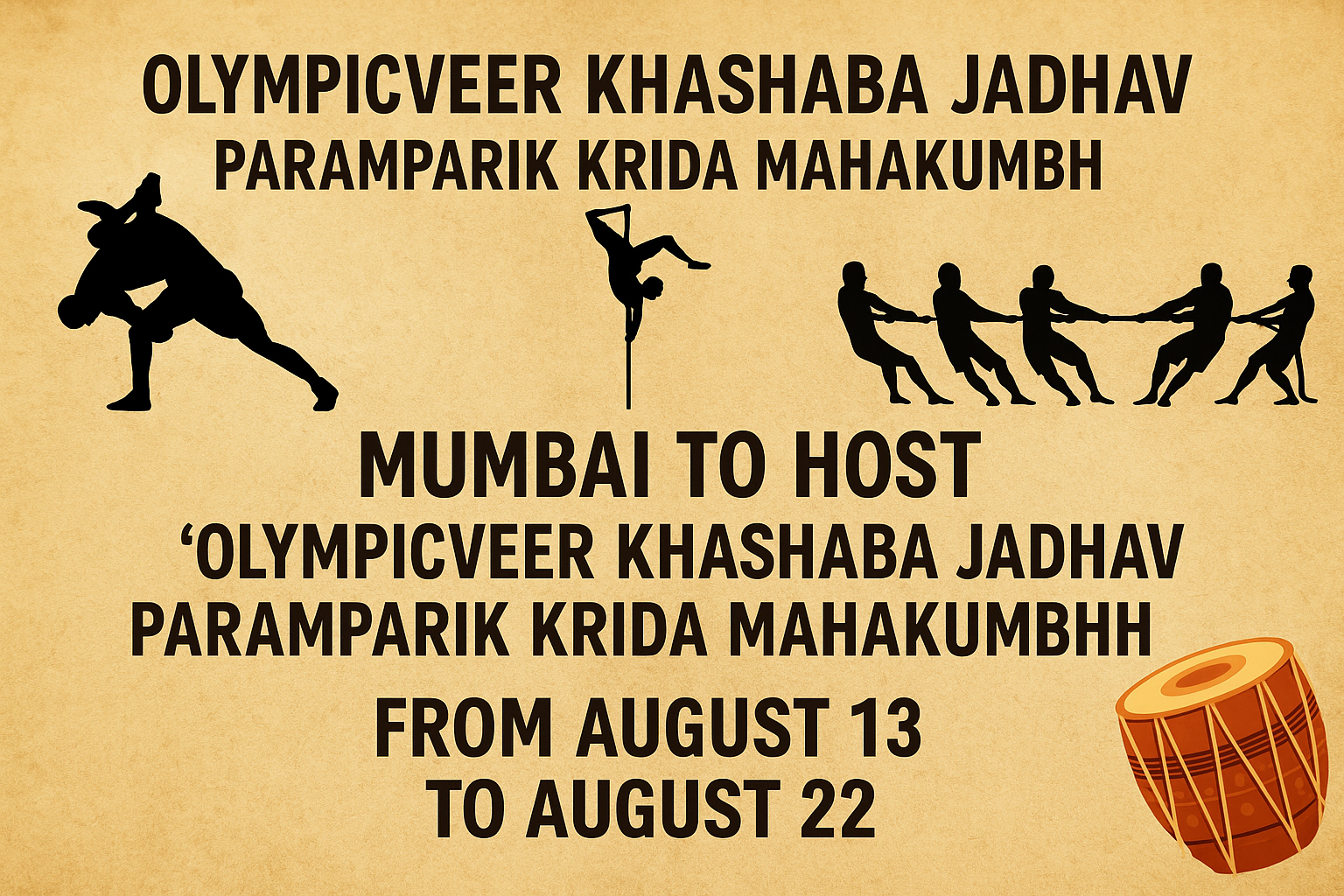
Mumbai Set to Celebrate Indigenous Sports with Olympicveer Khashaba Jadhav Paramparik Krida Mahakumbh
Mumbai: Starting August 13, Mumbai will transform into a vibrant arena for Maharashtra’s traditional games as the Olympicveer Khashaba Jadhav Paramparik Krida Mahakumbh kicks off at Kurla. The venue—Jam Saheb Mukadam Government Industrial Training Institute Ground—will be formally inaugurated as the Punyashlok Ahilyadevi Holkar Indigenous Sports Ground, a dedicated space for indigenous and cultural sports.
The initiative, driven by Skill Development Minister Mangal Prabhat Lodha and guided by Chief Minister Devendra Fadnavis, is not just a sporting event—it’s a cultural revival. Lodha summed it up neatly: “Our traditional games are more than entertainment – they are a part of our cultural legacy.”
Grand Opening, Rich Legacy
The inauguration will be presided over by State Minister for Sports and Youth Welfare Manikrao Kokate, with a special video address from CM Fadnavis. Adding an emotional touch, Ranjit Jadhav, son of legendary Olympian Khashaba Jadhav, will attend—linking Maharashtra’s past sporting glory with its present aspirations.
The event’s title honours Khashaba Jadhav, India’s first individual Olympic medallist in wrestling, and Punyashlok Ahilyadevi Holkar, the revered Maratha queen known for her visionary leadership and cultural patronage. This dual dedication makes the Mahakumbh a bridge between athletic excellence and cultural stewardship.
More Than Just Sports
From August 13 to 22, the ground will echo with the rhythms of Lezim, the swift moves of Lagori, and the agility of Viti Dandu. Traditional power contests like wrestling, arm wrestling, and tug-of-war will share space with Mallakhamb, Pawankhind Race, and community games like Fugdi.
These aren’t just games—they are living archives of Maharashtra’s social history. Many originated in rural courtyards and temple festivals, carrying values of teamwork, endurance, and respect for tradition.
Participation That Speaks Volumes
The enthusiasm is already visible. Over 15,000 participants have registered from across Mumbai through Kreeda Bharati, the organising body. Schools, ITIs, and colleges are participating in large numbers, ensuring that the energy of youth fuels this revival.
In a city where cricket dominates headlines, such overwhelming interest in indigenous sports is noteworthy. It suggests that, with the right platform, traditional games can reclaim their relevance—even in metropolitan settings.
Cultural Revival as Civic Duty
Minister Lodha emphasised that remembering and reviving the contributions of leaders like Punyashlok Ahilyadevi Holkar is not optional—it is an obligation. “The responsibility lies with us to keep our heritage alive,” he noted. This Mahakumbh is thus not just a competition but a statement: that in an age of virtual gaming and shrinking playgrounds, Maharashtra still values its grassroots sporting traditions.
A Call to Join
For those inspired to participate, registrations remain open for organisations, sports clubs, and institutions. Interested groups can call 9867066506 or 9768327745 to sign up.
Why This Matters
In the language of economics and society—often used by columnist Manish Sabharwal—this Mahakumbh is an investment in cultural capital. It boosts community cohesion, nurtures fitness, and strengthens identity. These games are low-cost, high-return assets: they require minimal infrastructure, yet yield rich dividends in health, discipline, and social connection.
As Mumbai gears up for ten days of colour, competition, and camaraderie, the message is clear: modern cities can still make space for ancient games. The Olympicveer Khashaba Jadhav Paramparik Krida Mahakumbh is proof that heritage, when celebrated, can be as exhilarating as any modern sport—perhaps even more, because it belongs to us.





